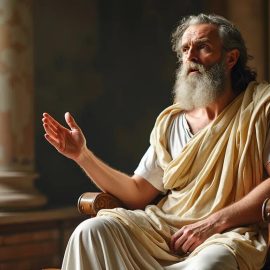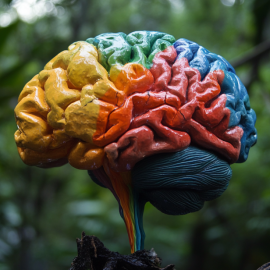

This article is an excerpt from the Shortform book guide to "Big Magic" by Elizabeth Gilbert. Shortform has the world's best summaries and analyses of books you should be reading.
Like this article? Sign up for a free trial here .
Do you believe everyone has a creative genius inside? Or do you think creativity is the prerogative of the lucky few?
In her book Big Magic, Elizabeth Gilbert advises that you view your creative genius as an entity that exists outside of you which occasionally graces you with visits. This perspective, she says, helps you to hang on to your creative freedom over the long term by reducing personal responsibility for brilliance.
In this article, we’ll explore Gilbert’s concept of creative genius.
View Your Genius as a Separate Entity
Gilbert stresses the importance of seeing your genius as something outside of yourself, rather than as an identity you inhabit, to avoid anguish around your work.
If, says Gilbert, you see yourself as singularly responsible for your work, when you produce something bad, you’ll feel the weight of that failure rests solely on your shoulders. You’ll frame this as a personal shortcoming, and this may stymie you or put you off creative work altogether.
Conversely, writes Gilbert, if something you make is exceptional, and you’re hailed as a “genius,” you’ll be burdened by the need to uphold that title. You’ll feel pressure to forever produce groundbreaking work, which is simply not possible for any human. This pressure may become so great that you never create again.
Instead of taking either above route, if you see yourself as simply “working with what you have,” says Gilbert, you’ll be able to distance yourself from sub-par work and frame it merely as something completed without your genius. This will allow you to engage with a new project with less self-reproach and anguish.
| Does “Genius” Even Exist?” Kevin Ashton, a noted technologist who coined the phrase “internet of things,” argues in his book How to Fly a Horse: The Secret History of Creation, Invention and Discovery that genius is nothing more than hard work combined with trial and error. Ashton draws on his own lived experience to come to this conclusion: He worked for several years for MIT and realized that the great intellects studying and researching there were simply using normal patterns of thought and discovery to lead them to big breakthroughs. Renouncing the concept of the genius may help you cope with the mental hurdles around success and failure which Gilbert mentions: When you succeed, you won’t feel the pressure to repeat that success, as you know it may not be humanly possible to do so—you’re no genius, after all. Similarly, if you fail, you won’t feel as badly, as you know you’re only human and not capable of succeeding all the time. |

———End of Preview———
Like what you just read? Read the rest of the world's best book summary and analysis of Elizabeth Gilbert's "Big Magic" at Shortform .
Here's what you'll find in our full Big Magic summary :
- Why integrating creativity into your daily life will make you feel more fulfilled
- Why creating for money is a form of self-sabotage
- Why you should never focus on external validation of your creations






